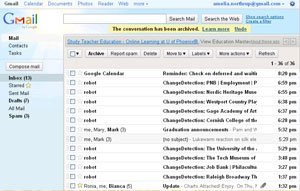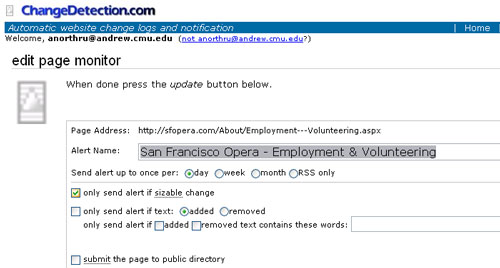Tech tools for your arts job search
 After two years writing for Technology in the Arts, I am leaving the Center for Arts Management and Technology. The unfortunate part about being a graduate student is that you will have to leave a place you love after a certain number of years, and my number is up! Special thanks to David and the rest of the CAMT staff for making the last two years amazing, educational, and memorable. I am very excited about my new position with the data-driven arts and entertainment consulting firm TRG Arts. I have been hired as the Strategic Communications Specialist, which means I will serve as a writer and editor for the firm’s consulting projects, Data Lab research and analytics projects, and a contributor to TRG’s knowledge center online.
After two years writing for Technology in the Arts, I am leaving the Center for Arts Management and Technology. The unfortunate part about being a graduate student is that you will have to leave a place you love after a certain number of years, and my number is up! Special thanks to David and the rest of the CAMT staff for making the last two years amazing, educational, and memorable. I am very excited about my new position with the data-driven arts and entertainment consulting firm TRG Arts. I have been hired as the Strategic Communications Specialist, which means I will serve as a writer and editor for the firm’s consulting projects, Data Lab research and analytics projects, and a contributor to TRG’s knowledge center online.
Before I leave Technology in the Arts, I wanted to share some of the secrets I learned during the last few months of looking for arts jobs, mainly at non-profit organizations. Because nonprofits usually begin their fiscal year in July, new positions at these organizations are often posted in the summer. That means now is the prime time for you to find your new dream job in the arts.
Here are my favorite tech tools to help you find that job:
Changedetection.com
Arts jobs often need to be filled quickly, which also means the time you have to apply is limited. We’ve all had the experience of finding a great—no, perfect—job and finding out that the “apply by” date has passed or being informed after you’ve submitted your resume that the company had already extended an offer to someone.
Changedetection.com comes in handy when you know that there is a company (or companies) you’d love to work for. Obviously you aren’t going to check in on the employment page of their website every day. Better that you just be notified when they post a job, right? Well, through the magic of technology, you can find out when that employment page changes. Changedetection checks the page every day, week or month (you specify which) and sends you an email when there has been a change.

If there is a specific geographic location you know you’d like to work in, changedetection can help too. For example, I was looking for jobs in Portland at the beginning of my search. I looked on the arts council website and there wasn’t a job board, but I wasn’t going to let a silly little thing like that stop me! What the arts council site DID have was a listing of all the arts orgs in Portland. I put a changedetection on the employment page of each organization I was interested in and got on with my search.
The downside of tracking all these pages is that you might have to sort through some jobs that aren’t for you. For example, I looked mainly at full-time marketing jobs, but I was notified for ANY job at those companies, including development and box office jobs, and in some cases, internships. However, you can take this as an opportunity to build networks. If you see a great job in finance, maybe you have a friend who looking who also happens to be a finance whiz. Forward the job to her and not only have you strengthened your friendship, but also she may want to return the favor if she comes across a job that fits you.
I would recommend setting these up relatively early in your job search and keep adding as you find companies that are of interest to you. This way, you will also see which jobs come up and how frequently as well as important information like salary ranges and organizational structure information. (For example, will you be working for someone who is a new hire herself/himself? Is there a new Executive Director at the org?)

The interface for monitoring a page on ChangeDetection.com
LinkedIn has attempted to tout itself as a job-finding service. However, at the early-career/emerging leader level, I find that is less helpful for finding jobs and more helpful for simply networking. There’s not that many headhunters out there for arts jobs, except in the executive level and maybe for IT people.
Anyway, how many times have we heard that the arts world is a small world? I use LinkedIn to see if there’s anyone I know who may know someone at the company I am applying to. If your relationship is good with that person, ask them to put in a good word for you.
Sometimes LinkedIn groups will have job postings; I haven’t found this to be true for most of the arts admin/management groups though. Please comment below if you know of a good group for this.
 GuideStar
GuideStar
For non-profit organizations, it’s essential to check out the company on GuideStar. GuideStar is a free service that gathers and publicizes information about nonprofit organizations. Much of the information is geared toward donors and foundations, but there is a lot of useful information on it for the job seeker.
Once you register (free), you have access to almost any arts organization’s 990 tax forms, which means you can see what the organization’s budget size is and how they are doing financially. Note that for many organizations, the most recent year might be 2008 or 2009, so the information could be slightly dated or influenced by the recession—which is still important to know. The 990 serves not only as a way to see if the org has a record of keeping a balanced budget, but also as a historical snapshot of the organization, in terms of grants received, senior staff turnover, and capital campaigns and similar projects, among other things.
GuideStar is also extremely helpful to estimate salaries, especially if you are applying to a director-level position. The IRS requires non-profits to list the salaries of their five highest-paid employees. This is pretty valuable information, as the size of most non-profit arts organizations means that you aren’t likely to find very accurate information on that exact job at that exact organization.
Arts Jobs Sites
One of my friends posted a status update recently “wondering if CareerBuilder is really a builder”. I replied that all it had “built” for me was piles of emails in my spam folder. Personally, I’ve had a lot more luck overall with industry-specific sites, some of which can be used in conjunction with changedetection, as discussed above. (Bonus: The industry-specific sites manage to present you with jobs without asking if you want information from University of Phoenix every other time you go to look at a job. Just saying.) Here are my favorites:
General:
- CAMT’s own ArtsOpportunities
- Americans for the Arts' Job Bank
By discipline:
- Playbill Job Listings (mostly theatre)
- Theatre Communications Group's Arts Search (need a log-in and password for this one)
- Association of Performing Arts Presenters Job Bank
- Opera America Job Listings (also available as an RSS Feed)
- Dance USA Jobs in the Arts
- Association of Children’s Museums
- American Association of Museums' jobHQ
- Chronicle of Higher Education (mostly faculty positions at colleges and universities)
- Also, Createquity will occasionally post interesting opportunities, so that is worth adding to your RSS feed if you haven’t already.
State and local arts councils may have a good job posting site, depending on where you’re looking to find a job. For example:
- Greater Philadelphia Cultural Alliance
- Cultural Alliance of Greater Washington (Washington D.C., not Washington state)
- New York Foundation for the Arts
Lastly, if you have an interest in development or program management, heads up! There are a few sites/ email alerts that I’ve found especially useful:
Philanthropy News Digest (A service of Foundationcenter.org)
PND has created a job alert system that will email you a daily summary of recent jobs in your area of interest. I cast my net wide by checking a lot of states and position types (communications, development, program management, etc) when I signed up for the alerts. I now get about 15 job postings a day. The fields of the organizations are quite diverse too. A recent email contained jobs from Napa Valley Opera House, University of Chicago, the Rainforest Alliance, and Vera Institute of Justice.
Chronicle of Philanthropy posts mostly development jobs, which, like PND, you can sort by location, position type, and the field of the organization (education, health, museum, etc).
It’s also worth mentioning that DotOrgJobs is good for fundraising jobs and other nonprofit jobs; however, I have not seen a lot of arts-specific jobs from them. You can subscribe via email or RSS feed.
On organizing email alerts:
You might be saying to yourself, “That’s a lot of email alerts to deal with.” I use gmail and have set a rule to have these emails automatically labeled “job search” and archived so that they don’t clutter up my inbox. Then I set an alert on Google Calendar reminding me to go through them once a week, so that I actually read them! This can also easily be done with Outlook.
Do you know of any other good sources for arts jobs? If so, please post them below! Happy hunting!